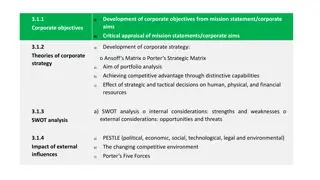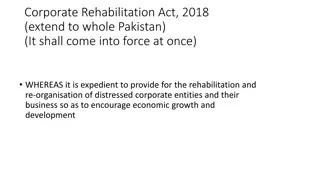
Importance of Corporate Planning in Business Success
Explore the significance of corporate planning in guiding business strategies and achieving goals. Learn about strategic, tactical, operational, and contingency planning to ensure efficient resource allocation and overcome challenges in business operations.
Download Presentation

Please find below an Image/Link to download the presentation.
The content on the website is provided AS IS for your information and personal use only. It may not be sold, licensed, or shared on other websites without obtaining consent from the author. If you encounter any issues during the download, it is possible that the publisher has removed the file from their server.
You are allowed to download the files provided on this website for personal or commercial use, subject to the condition that they are used lawfully. All files are the property of their respective owners.
The content on the website is provided AS IS for your information and personal use only. It may not be sold, licensed, or shared on other websites without obtaining consent from the author.
E N D
Presentation Transcript
Planning is important to professionals and businesses because it provides direction for daily actions. Corporate planning is more focused on preparing courses of action for all the activities of a business. successfully effectively. In this article, we explain what corporate planning is, the types of corporate planning and the stages involved in the creation of a corporate plan. Corporate planning is the process by which businesses create strategies for meeting business goals and achieving objectives. It involves strategy definition, strategy direction, decision-making and business operations are orderly and that the team works towards the same goals. It can also help you identify potential challenges in meeting goals, so you can provide methods to overcome them. Corporate planning is a continuous and dynamic process that lasts throughout the life of the business. Understanding manage corporate business planning or can help work you more a help you resource allocation. Corporate planning ensures that
The different types of corporate planning include: Strategic Strategic planning overlaps with corporate planning in some areas, though there are still key differences. Strategic planning requires a close look at the company's missions, strengths and weaknesses. It defines the present state, the desired future and how to get there. Corporate planning is much larger in scope than strategic planning. You can use it to guide a more complex company with many businesses and subsidiaries. The corporate plan has the same components as the strategic plan, though it pertains only to the broader company and any shared services used by the various units, such as marketing and human resources. It also considers the individual steps of the business. These include how to counteract challenges, train employees and achieve objectives. Strategic planning planning
Tactical Tactical planning involves defining goals and determining how to achieve them through actions and steps. It's the next step that a business takes after formulating a strategic plan. With it, you can break down the strategic plan into smaller goals and objectives. Generally, you can create a tactical plan to address a short-term goal. Completing the tactical plan may help you work to achieve medium or long-term goals. Operational An operational plan is a specific, detailed plan that outlines the details of the business's daily operations for a specific period, usually more than one year. It outlines the daily tasks and responsibilities of each employee and manager and the mode of operation of the tasks. Operational planning helps you allocate physical, financial and human resources, so you can reach short- term objectives that support a business' larger growth. Tactical planning planning Operational planning planning
Contingency Contingency planning is the process by which organisations develop strategies that help ensure they respond to an event that could impact their operations. The purpose of a contingency plan is to ensure that a business resumes normal activities after a disruptive event, such as a natural disaster. Businesses also plan contingency plans around positive events, like an unexpected influx of cash. Contingency planning planning






















